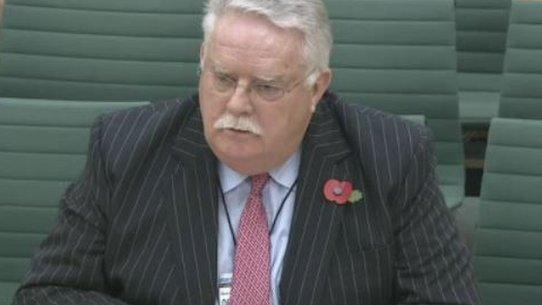Former Co-op Bank chief Paul Flowers says 'I have sinned'
- Published
Paul Flowers: "I have had several hellish months"
Disgraced former Co-op Bank chairman Paul Flowers has spoken for the first time since his arrest over drugs allegations, saying: "I have sinned."
The Methodist minister, who stepped down from the bank last summer, told BBC Newsnight some of his "frailties" had been exposed in the public domain.
He was arrested last November after the Mail on Sunday published footage showing him allegedly buying drugs.
Mr Flowers, 63, said the last few months had been "hellish" at times.
In a wide-ranging, exclusive interview with Newsnight, he also revealed how the government had put pressure on the Co-op Bank before it aborted plans to buy 600 Lloyds branches.
He said ministers had made it clear they wanted the deal, which exposed for the first time the Co-op Bank's poor financial health, to go ahead.
'Cathartic and traumatic'
Mr Flowers, who has been a minister in Bradford since 1976, said "things got pretty hairy" for him last November when he was arrested as part of what police called a "drugs supply investigation" following the newspaper allegations. He is currently on bail.
At the time he was also facing questions about his suitability to have led the Co-op Bank, after he had appeared before a committee of MPs and told them the bank's assets were £3bn when they were actually £47bn.
"I am in company with every other human being for having my frailties and some fragility exposed," he said.
"Most people get through life without that ever coming into the public domain. But, of course I have sinned in that old-fashioned term, which I would rarely use, I have to say."
He added: "Up to [November] there hadn't been much commentary about things we were doing at the bank, but it got worse after that.
"And for me personally there have been several moments where it has been hellish.
"You certainly find out who your friends are because a significant number of people in politics and in the Co-op, and some in the Church, have been noticeable by their silence or their absence."
Addictions treatment
After his arrest at his home in Merseyside, he said he had sought "professional support for the issues that I was facing" and underwent a 28-day addictions treatment programme, which he found both "cathartic and traumatic".
Of his appearance before MPs, he said he had been ill-prepared for the experience and was also put off by some MPs trying to "trip me up" with their questioning and score political points.
Paul Flowers: BBC Newsnight interview in full
He defended his appointment as the Co-op Bank's chairman, saying: "Others made a judgement that I was the right and appropriate person to be the chair at that particular time. And it went through a very rigorous process of selection."
When asked if he had been involved with drugs while chairman of the Co-op Bank, Mr Flowers replied: "I think you're aware that there are still some issues to be enquired into by the police and that is a question that I think has to remain at the moment unanswered."
He denied any involvement with drugs before he became chairman, but added: "That doesn't answer the earlier question. And I cannot answer it for the moment."
Mr Flowers, who is a former Labour councillor in Bradford and Rochdale, was chairman of the Co-op Bank from April 2010 to June 2013.
Financial troubles
The bank had to be rescued last year after it was left with a £1.5bn capital shortfall, with many of its troubles stemming from its merger with the Britannia building society in 2009.
Its poor financial health was first discovered in 2012, when it was trying to acquire more than 600 branches from Lloyds in a process known as Project Verde.
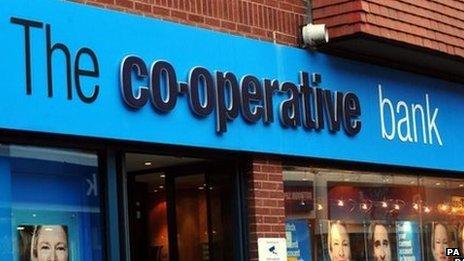
The Co-op group is cutting staff as it battles to survive
The Co-op Bank was a frontrunner to buy the branches but later withdrew its offer.
Mr Flowers said he had come under "considerable" pressure to make that deal happen "from the present government - and mainly from Conservatives".
He said: "They wanted a deal and remember that the government was - still is - the major shareholder of that bank because of the structural support it had needed in 2008.
"Clearly they wanted a deal which would help them in terms of public finances. They actually said that they were keen on Co-op becoming a much more significant player, with more scale.
"We would have had about 7-8% of the market if this had gone through. And there was pressure certainly from [junior minister] Mark Hoban, but I believe, and know, that that originated much higher up, with the chancellor himself."
New shares
A Treasury spokesman said: "The selection of the Co-op and the decision on whether to proceed with the Verde deal was a purely commercial matter for Lloyds Bank and the Co-op Bank, as the chairman and chief executive of Lloyds have consistently made clear.
"Since the full extent of the situation at Co-op Bank became clear, the chancellor has ordered an independent investigation into the events at the Co-op Bank and the circumstances surrounding them."
Last November, the Co-op announced that a group of private investors, made up mostly of hedge funds, would inject nearly £1bn into the bank for a 70% ownership stake.
On Monday, the bank said it planned to raise another £400m by issuing new shares following the discovery of additional costs, the biggest part of which relates to PPI mis-selling and lapses in the provision of mortgages.
The bank said the discovery meant it would make a loss of £1.2bn to £1.3bn for 2013.
- Published24 March 2014
- Published24 March 2014
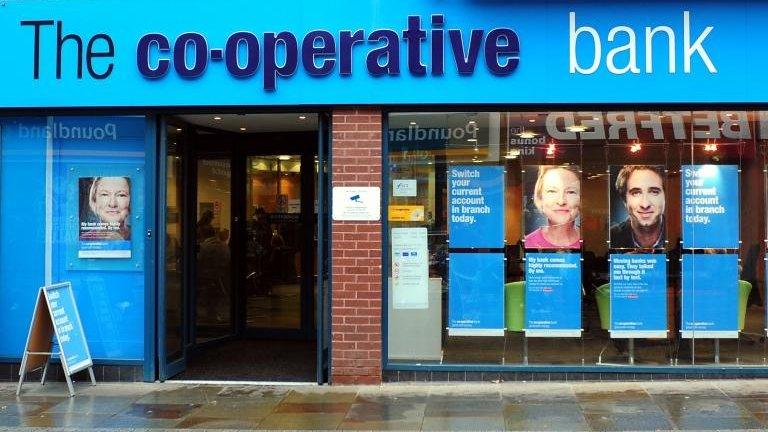
- Published7 May 2014
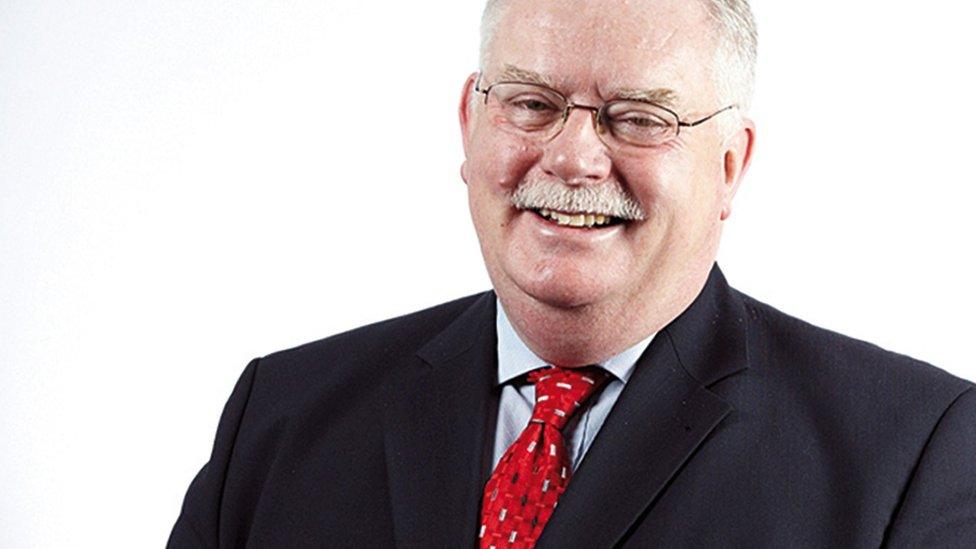
- Published14 January 2014
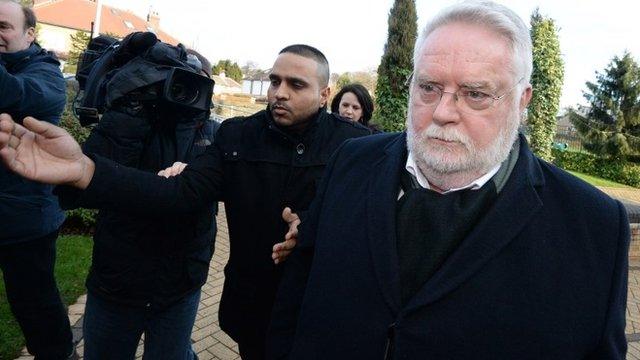
- Published19 November 2013
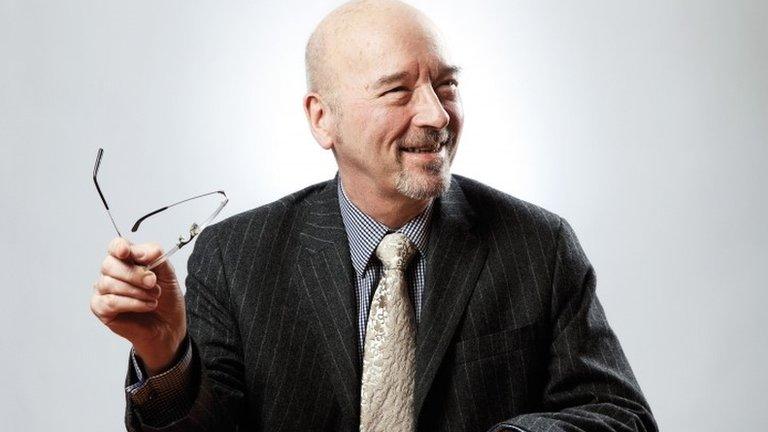
- Published18 November 2013
